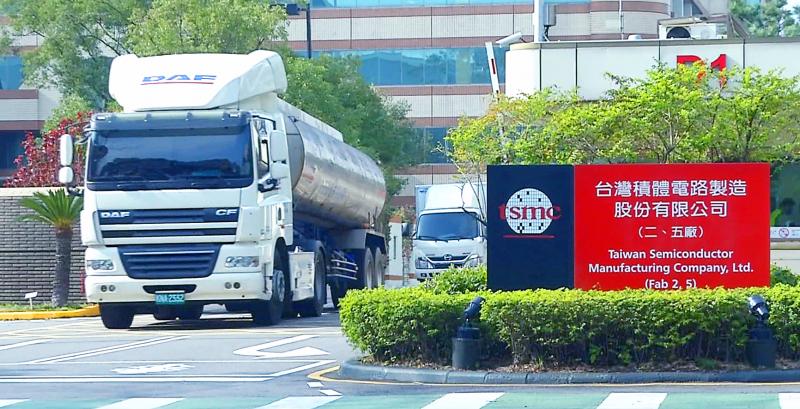Taiwan Semiconductor Manufacturing Co (TSMC, 台積電) last year saved almost 2 million tonnes of water as part of its efforts to fulfill its commitment to reach net-zero emissions by 2050, the company’s financial disclosure report said.
To reach its zero emissions goal, TSMC has been taking action to broaden its green influence and drive industry toward low-carbon sustainability, chairman Mark Liu (劉德音) said in the company’s Task Force on Climate-related Financial Disclosures report released last week.
TSMC saved 1.927 million tonnes of water last year by adopting measures such as reducing water consumption by facility systems, increasing wastewater recycling by facilities and decreasing water discharge from the systems, the report said.

Photo: CNA
Last year, it also invested NT$1.6 billion (US$57.69 million) in water conservation and recycling equipment, and spent an additional NT$1.2 billion on equipment operation and maintenance, it said.
By 2030, TSMC aims to reduce the amount of water it uses by 30 percent from 2010, the report said, adding that its water consumption last year fell 8.9 percent from 2010.
After Taiwan experienced a major water shortage from the end of last year to May, TSMC compiled statistics for drought risk assessments in the report, which showed that from 1986 to 2005 the longest Hsinchu City and Hsinchu County had gone without rain was 40 days, while for Taichung it was 52 days and for Tainan 62 days.
The number of days Hsinchu City and Hsinchu County, Taichung and Tainan would go without rain in 2035 is forecast to rise 4.15 percent, 2.42 percent and 2.28 percent respectively from 2016, the company said.
From 2081 to 2100, the longest stretch without precipitation in Hsinchu City and Hsinchu County could increase 14.44 percent from the 1985-to-2005 period, and it could grow 11.33 percent for Taichung and 10.73 percent for Tainan, it said.
If a drought occurs every 10 years, it could cause an average reduction of 0.7 to 1.1 percent in TSMC’s annual operating revenue, the company said.
As water shortages in Taiwan are likely to worsen, TSMC said it has also established a comprehensive water monitoring mechanism to regularly check the status of water supplies in the country.
The company is improving its water conservation measures, increasing the recycling rate of process wastewater and establishing comprehensive monitoring mechanisms for water supply, the report said.
It is also expanding the use of reclaimed water, and preparing water trucks to minimize the effect of water shortages on operations and eliminate production interruptions, it said.

NEW IDENTITY: Known for its software, India has expanded into hardware, with its semiconductor industry growing from US$38bn in 2023 to US$45bn to US$50bn India on Saturday inaugurated its first semiconductor assembly and test facility, a milestone in the government’s push to reduce dependence on foreign chipmakers and stake a claim in a sector dominated by China. Indian Prime Minister Narendra Modi opened US firm Micron Technology Inc’s semiconductor assembly, test and packaging unit in his home state of Gujarat, hailing the “dawn of a new era” for India’s technology ambitions. “When young Indians look back in the future, they will see this decade as the turning point in our tech future,” Modi told the event, which was broadcast on his YouTube channel. The plant would convert

‘SEISMIC SHIFT’: The researcher forecast there would be about 1.1 billion mobile shipments this year, down from 1.26 billion the prior year and erasing years of gains The global smartphone market is expected to contract 12.9 percent this year due to the unprecedented memorychip shortage, marking “a crisis like no other,” researcher International Data Corp (IDC) said. The new forecast, a dramatic revision down from earlier estimates, gives the latest accounting of the ongoing memory crunch that is affecting every corner of the electronics industry. The demand for advanced memory to power artificial intelligence (AI) tasks has drained global supply until well into next year and jeopardizes the business model of many smartphone makers. IDC forecast about 1.1 billion mobile shipments this year, down from 1.26 billion the prior

People stand in a Pokemon store in Tokyo on Thursday. One of the world highest-grossing franchises is celebrated its 30th anniversary yesterday.

Zimbabwe’s ban on raw lithium exports is forcing Chinese miners to rethink their strategy, speeding up plans to process the metal locally instead of shipping it to China’s vast rechargeable battery industry. The country is Africa’s largest lithium producer and has one of the world’s largest reserves, according to the US Geological Survey (USGS). Zimbabwe already banned the export of lithium ore in 2022 and last year announced it would halt exports of lithium concentrates from January next year. However, on Wednesday it imposed the ban with immediate effect, leaving unclear what the lithium mining sector would do in the